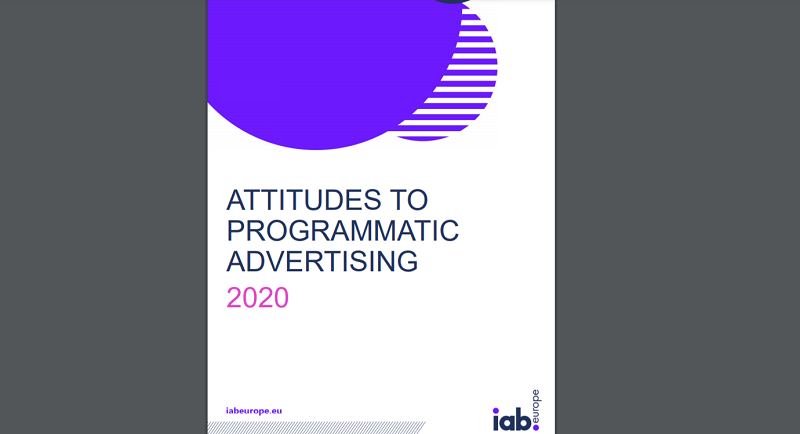Programmatic revenue grew by 23% in 2019, topping €23bn, with 77% of display and more than 50% of video now traded via programmatic methods, according to new research.
The 2020 IAB Europe Attitudes to Programmatic study which surveyed over 350 advertisers, publishers, agencies and ad-tech vendors from 31 markets. Now in its sixth year, the study has become an industry benchmark to show how programmatic advertising attitudes, adoption and strategies are evolving.
The main findings showed:
• Among advertisers, ‘better use of data’ was the number one driver for programmatic investment. Since last year it has become much more impactful, increasing from 69% in 2019 to 80% in 2020. Whereas for those at the agencies, the majority cited ‘targeting efficiencies’ is their number one driver.
• With the rise in advertiser investment in programmatic, ads.txt inventory purchasing is increasing, as is awareness. 52% of Publishers meanwhile said they were selling more than 81% of their ads.txt inventory.
• The trend of in-housing that the industry was talking about is now moving in the opposite direction as advertisers with an in-house model have decreased from 38% (2019) to 20% (2020)
• Now, the buy-side continues to evolve towards hybrid models. In 2019, 15% of advertisers stated that they had a hybrid model for programmatic trading. This has increased to 30% in 2020.
Now in its sixth year, the study has become an industry benchmark to show how programmatic advertising attitudes, adoption and strategies are evolving. The responses came from advertisers, agencies, publishers and ad tech vendors in 31 markets with respondents having both pan-European and Global remits. More than half of the respondents manage annual advertising budgets of €1m or above.
The latest research from the Programmatic Advertising Spend Research reveals that programmatic revenue grew by 23% in 2019, topping €23bn, with 77% of display and more than 50% of video now traded via programmatic methods.
Commenting on the double-digit growth seen in the 2019 report, Daniel Knapp, Chief Economist at IAB Europe said “Programmatic is on the path to become the default infrastructure for digital advertising. Our newly consolidated 2019 figures across European markets showed continued double-digit growth in programmatic despite increased market maturity. This growth is visible in all markets – from established programmatic pioneer markets like the UK and France to CEE markets which benefit from a second mover advantage to ramp up programmatic spend particularly quickly. This growth is underpinned by continuing efforts to streamline the programmatic supply chain and the expansion of programmatic into premium environments such as video.”
The 2020 IAB Europe Attitudes to Programmatic study highlighted the following:
• Among advertisers, ‘better use of data’ was the number one driver for programmatic investment. Since last year it has become much more impactful, increasing from 69% in 2019 to 80% in 2020. Whereas for those at the agencies, the majority cited ‘targeting efficiencies’ is their number one driver.
• With the rise in advertiser investment in programmatic, ads.txt inventory purchasing is increasing, as is awareness. 52% of Publishers meanwhile said they were selling more than 81% of their ads.txt inventory.
• The trend of in-housing that the industry was talking about is now moving in the opposite direction as advertisers with an in-house model have decreased from 38% (2019) to 20% (2020)
• Now, the buy-side continues to evolve towards hybrid models. In 2019, 15% of advertisers stated that they had a hybrid model for programmatic trading. This has increased to 30% in 2020.
Looking at the barriers to programmatic adoption, supply chain transparency ranks as the primary concern for advertisers. With advertisers reporting the need for greater control of inventory and at a lower cost, they are demanding transparency and clarity around technology fees from their partners. To alleviate cost concerns, nearly two thirds of ad tech vendors report making investments to offer a fully transparent business model.
Meanwhile, advertisers and publishers cited brand safety was significantly less of a ‘barrier’ to programmatic investment in 2020. It dropped from 34% in 2019 to 10% in 2020 for advertisers and 27% in 2019 to just 9% in 2020 for publishers. This could indicate industry advancements in these areas but also the acknowledgement that fraud protection and brand safe environment are not unique, but rather industry standards for programmatic partners to deliver and guarantee.
As far as growth areas are concerned, one clear winner stood out across all others: Connected Television (CTV). Whilst the report showed that current investment in CTV remains low with 60% of agencies and advertisers saying they were investing less than 20% of their overall programmatic budgets, growth was cited for 2021. 70% of advertisers and 61% of agencies think CTV will be one of the key programmatic growth areas over the next 12 months. Publishers are divided between audio (46%) and CTV (46%) and 40% of advertisers also believe audio will drive growth. Almost a third of agencies also believe DOOH will drive growth.
2020 has certainly brought new challenges to the digital advertising industry but a surprising silver lining has been the resilience the programmatic landscape has demonstrated.
Commenting on the release of today’s report, David Goddard, Senior Business Development Business Solutions EMEA, DoubleVerify & Chair of IAB Europe’s Programmatic Trading Committee said “The annual Attitudes to Programmatic report truly is a finger on the pulse of the European digital market. Each year the survey draws out the key concerns and opportunities that impact all of digital marketing. It enables the committee and the wider industry to devise new and amend current strategies to tackle key issues or take advantage of opportunities for the next year to come.”
The full reports can be downloaded on IAB Europe’s website here.
